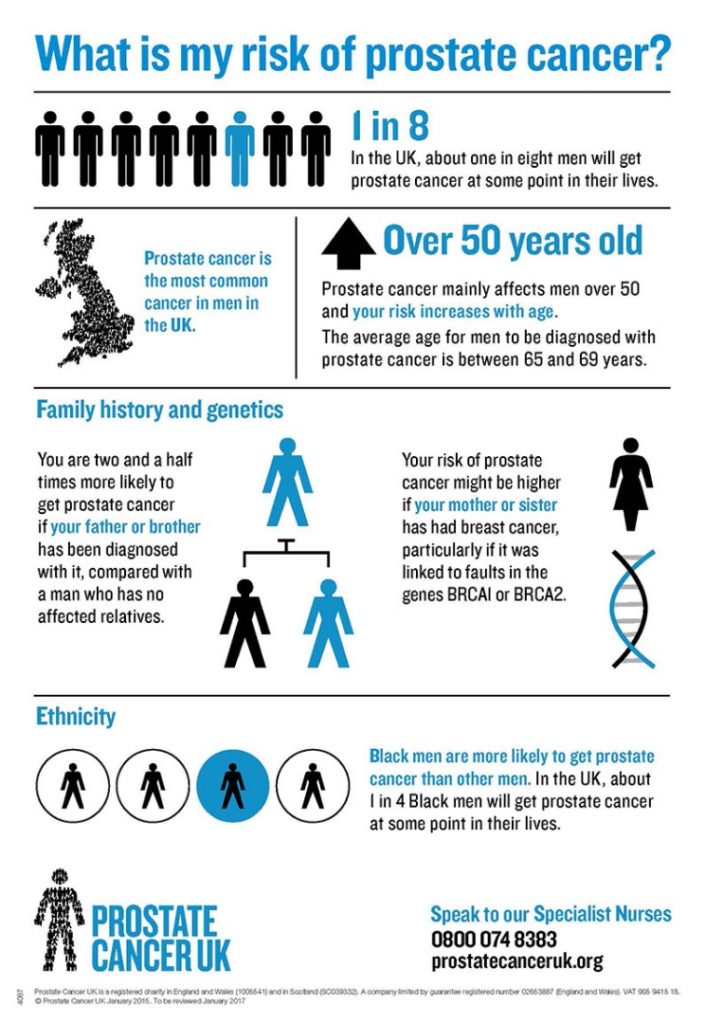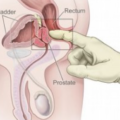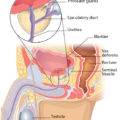Facts about prostate cancer every man should know
With increasing knowledge about the catastrophic consequences of cancers, surprisingly less is been said about prostate cancer; a silent killer of men. Prostate cancer is the second leading cause of death from cancers in men after lung cancer and it is second only to skin cancer as the most common cancer in men. This is one of the few cancers that are sex-specific, i.e it affects only one sex (in this case men). Women don’t have a prostate, so cannot develop prostate cancer.
The prostate
It is a gland about the size of a walnut and lies below the urinary bladder. It’s function is to secrete an alkaline fluid, milky in appearance. The fluid constitutes roughly 30% of the volume of the semen along with sperm and seminal fluid. The average weight of the prostate in adult males is 11grams.
Risk factors for prostate cancer
Wondering who is at risk of prostate cancer. Here are some important prostate risk factors.
- Increasing age: Men older than 75 years account for two-thirds of prostate cancer deaths
- Family history: Individuals with first degree relatives (father, son or brother) who have prostate cancer are at higher risk of developing the disease.
- Race: More common in blacks. African Americans have the highest rate in the world
- Genetics: Although prostate cancer cannot be inherited some men inherit genes that predispose them to prostate cancer
- Nutritional factors: Some nutrients have protective effects against prostate cancer and include soy protein, lycopene, vitamin E and selenium. On The other hand, increased fat intake raises the risk.
See: Breast Cancer NGO In Nigeria
Here is a good infographic that explains prostate cancer risk.
Symptoms
- In early stages (confined to the prostate), there area usually no symptoms. Greater than 60% of prostate cancer patients are asymptomatic
- Difficulty urinating
- Sudden urge to urinate
- Pain in the lower back or thighs
- Swelling in the legs
Diagnosing prostate cancer
- Blood test : Prostate specific antigen (PSA) test is a very useful test as prostate cancer causes an increase in this antigen. Increased PSA does not necessarily mean cancer as there are other factors that cause increased PSA. It is pertinent for increased levels to be investigated by a specialist.
- Digital rectal examination (DRE): This involves a doctor examining the prostate by inserting a gloved and lubricated finger into the rectum. This reveals distortion in the anatomy of the gland. Normal DRE findings do not rule prostate cancer though.
- Biopsy: This involves the use of a special needle to harvest prostate tissue which is subjected to histology in order to view the cells.
- Other modalities include radionuclear bone scan, computed tomography and magnetic resonance imaging
Treatment
- Hormone therapy: May involve androgen deprivation achieved by removal of the testes (orchidectomy) or by medical castration. Recently, luteinizing hormone-releasing hormone (LHRH) agonists have become useful
- External beam radiotherapy
- Brachytherapy: Involves implantation of radioactive seeds in the prostate
- Surgery: Involve the removal of the gland and some surrounding tissues (radical prostatectomy)
- Chemotherapy
Click Here to Read : Prostate Massage and Prostate Milking
What to do
- Early detection is key: Nearly 100% of men diagnosed with prostate cancer in it’s early stages will be alive five years after diagnosis. Also, prostate cancer that is confined to the prostate has high cure rates but once it begins to spread, prognosis becomes poor
The American Cancer Society recommends that men who have reached 50 years should begin screening for the disease. Furthermore, men who have a first degree relative with prostate cancer before the age of 65 should begin screening at 40 years
- Lifestyle changes: Some factors could possibly reduce your chances of developing prostate cancer.
– Nutrition: Eat a diet that is rich in fruits, vegetables and whole grains, while low in red meat and fats
– Quit smoking: A link has been established between smoking and prostate cancer
– Exercise regularly and maintain a healthy weight.
Michael Otorkpa is the President CMDA
University of Abuja Teaching Hospital Chapter
Public Health Nigeria an Interdisciplinary public health movement focused on health education, advancing fair public health policies, promoting fitness, healthy diets, responsible behavior, community health and general well-being.







It is the most common cancer after skin cancer in men.
Haulleljah! I needed this-you’re my savior.